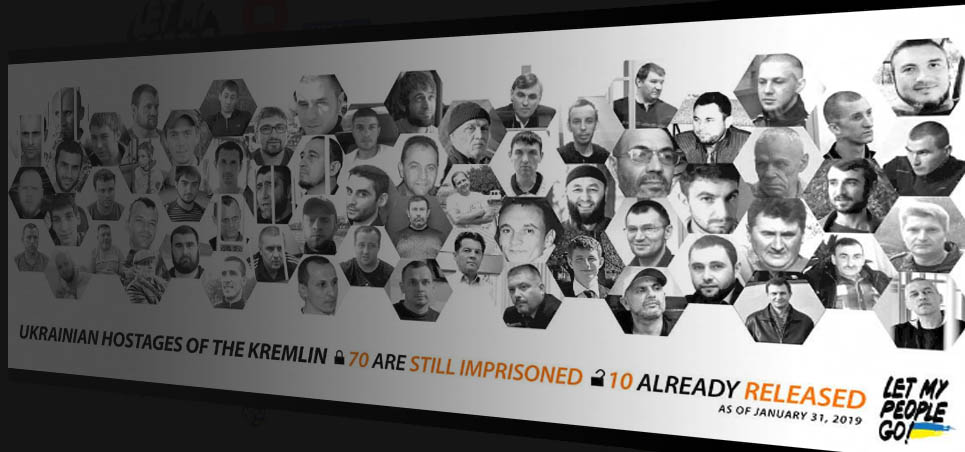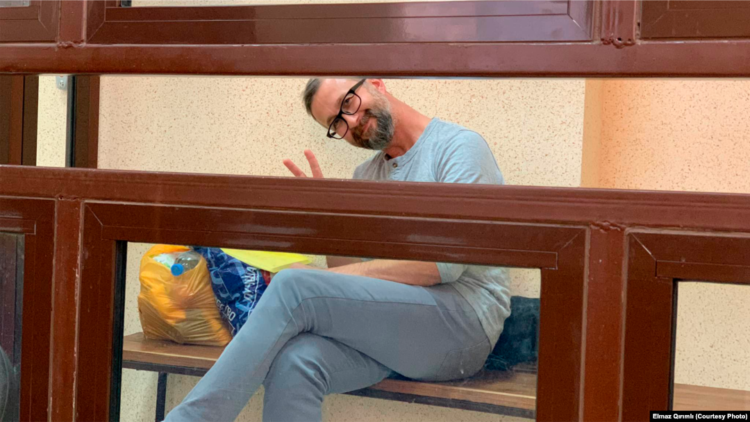The European Parliament has adopted a resolution calling on Russia to release Ukrainian citizens illegally sentenced and held in Russian prisons. 458 MPs voted in favor, 80 against, 89 abstained, Ukrainian MP Iryna Gerashchenko reported from the European Parliament, where a Ukrainian delegation involving former President Poroshenko was present.
The MPs condemned Russia's violations of human rights and norms of international law and demanded to immediately free the Ukrainian citizens illegally held in Russia and occupied Crimea, otherwise known as the Ukrainian political prisoners of the Kremlin. As well, the MPs called on Russia to immediately free the 24 Ukrainian Navy sailor POWs Russia had captured in November 2015 following an attack on Ukrainian ships in the Black Sea in November 2018, in accordance with a ruling of the UN International Tribunal for the Law of the Sea on 26 May 2019.
The resolution comes amid a renewed crackdown on Crimean Tatars in occupied Crimea, who are being routinely arrested on accusations of belonging to Hizb ut-Tahrir, an Islamic group Russia has outlawed as "terrorist" despite none of its members ever engaging in terrorist activities. Hizb ut-Tahrir is legal in most countries around the world, including Ukraine.
The armed searches in Crimean Tatar homes on 27 March and 10 June 2019 have brought the total number of Ukrainian political prisoners of the Kremlin to above 100. Many of the arrested are members of the Crimean Solidarity - a human rights group which coalesced to support the victims of Russia's political arrests in Crimea and their families, most of them Crimean Tatars. Many of the arrested are civic journalists shedding light on the tidal wave of repressions that came down on the peninsula after its occupation by Russia in March 2014.
Read more:
- Faces of the Crimean Solidarity group who Russia baselessly arrested as “terrorists”
- Only civic journalism can prevent Crimea’s total isolation. That’s why Russia is attacking it
- Russia arrests 23 Crimean Tatars after largest raid ever in occupied Crimea
Separately, the resolution mentions the attacks on Russian environmental activists who are "routinely detained and subjected to fines and detention in connection with peaceful environmental protests across the country" and calls on Russia to end the harassment against them.
Regarding the Ukrainian political prisoners, although it doesn't list their names as previous EU resolutions have, it suggests several practical solutions which would forward the issue of their release:
- It urges the HR/VP to address the President of the Russian Federation with the need to start a negotiation process over Ukrainian citizens detained for political reasons by Russia in occupied Crimea and in Russia;
- It calls on the EEAS and the Commission to make pressure on Russia in order to establish a constant negotiation platform which would focus at the humanitarian issues related to those arrested by both sides in connection with international armed conflict in the territory of Ukraine, namely those held in occupied Crimea and in Russia;
- It urges the Council to create a legal frame in the EU which would allow imposing personal sanctions against those responsible for grave human rights violations including torture or otherwise involved in such practices aimed against Ukrainian citizens persecuted by the Kremlin in connection with the armed conflict in Ukraine for political reasons.
The latter is especially pertinent given the ongoing discussions about the EU global human rights Act, otherwise called the EU Magnitsky Act, which would impose sanctions against grave human rights violators similar to those imposed by the US, Canada, UK, and other countries against Russian officials guilty of the imprisonment and ultimate death of Russian lawyer Sergei Magnitsky.
As well, the EU Parliament called on the EU Council to extend the EU sanctions on Russia as long as Moscow does not respect the Minsk accord and called for their for a 12-month period instead of 6 months as it is today and for the addition of new names on the sanction list and to take into account the possibility to introduce additional sanctions, for example related to the human rights violations in Crimea.
Read also:





